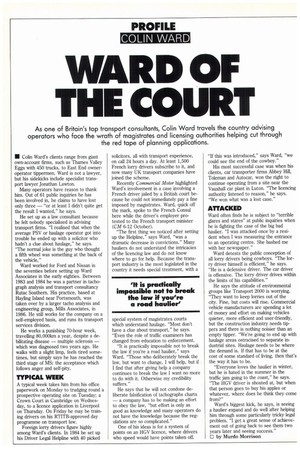WARD OF THE COURT
Page 44

If you've noticed an error in this article please click here to report it so we can fix it.
• Colin Ward's clients range from giant own-account firms, such as Thames Valley Eggs with 450 trucks, to East End owneroperator tippermen. Ward is not a lawyer, but his sidekicks include specialist transport lawyer Jonathan Lawton.
Many operators have reason to thank him. Out of 61 public inquiries he has been involved in, he claims to have lost only three — "or at least I didn't quite get the result I wanted," he says.
He set up as a law consultant because he felt nobody specialised in advising transport funs. "I realised that when the average PSV or haulage operator got into trouble he ended up with a solicitor who hadn't a clue about haulage," he says. "The normal joke is the guy who thought a fifth wheel was something at the back of the vehicle," Ward worked for Ford and Nissan in the seventies before setting up Ward Associates in the early eighties. Between 1983 and 1984 he was a partner in tachograph analysis and transport consultancy Rutac Southern. His practice, based at Hayling Island near Portsmouth, was taken over by a larger ticho analysis and engineering group, Mills Associates, in 1986. He still works for the company on a self-employed basis, and runs its transport services division.
He works a punishing 70-hour week, travelling 80,000km a year, despite a debilitating disease — multiple sclerosis — which was diagnosed two years ago. He walks with a slight limp, feels tired sometimes, but simply says he has reached the third stage of MS: the acceptance which follows anger and self-pity.
TYPICAL WEEK
A typical week takes him from his office paperwork on Monday to trudging round a prospective operating site on Tuesday; a Crown Court in Cambridge on Wednesday, to a licence application in Liverpool on Thursday. On Friday he may be training drivers on his RTITB-approved day programme on transport law.
Foreign lorry drivers figure highly among Ward's clients. In 1984 he set up his Driver Legal Helpline with 40 picked solicitors, all with transport experience, on call 24 hours a day. At least 1,500 French lorry drivers subscribe to it, and now many UK transport companies have joined the scheme.
Recently Commercial Motor highlighted Ward's involvement in a case involving a French driver jailed by a British court because he could not immediately pay a fine imposed by magistrates. Ward, quick off the mark, spoke to the French Consul here while the driver's employer protested to the French transport minister (CM 6-12 October).
"The first thing we noticed after setting up the Helpline," says Ward, "was a dramatic decrease in convictions." Many hauliers do not understand the intricacies of the licencing law and do not know where to go for help. Because the transport industry is the most legislated in the country it needs special treatment, with a special system of magistrates courts which understand haulage. "Most don't have a clue about transport," he says. "Even the role of traffic examiners has changed from education to enforcement.
"It is practically impossible not to break the law if you're a road haulier," says Ward. "Those who deliberately break the law, but want to change, I vvill help, but if. I find that after giving help a company continues to break the law I want no more to do with it. Otherwise my credibility suffers."
He says that he will not condone deliberate falsification of tachographs charts — a company has to be making an effort to obey the law, "but effort is only as good as knowledge and many operators do not have the knowledge because the regulations are so complicated."
One of his ideas is for a system of points on an HGV licence, where drivers who speed would have points taken off. "If this was introduced," says Ward, "we could see the end of the cowboy."
His most successful case was when his clients, car transporter firms Abbey Hill, Toleman and Autocar, won the right to continue operating from a site near the Vauxhall car plant in Luton. "The licencing authority listened to reason," he says. "We won what was a lost case."
ATTACKED
Ward often finds he is subject to "terrible glares and stares" at public inquiries when he is fighting the case of the big bad haulier. "I was attacked once by a resident when I was measuring the entrance to an operating centre. She bashed me with her newspaper."
Ward detests the public conception of all lorry drivers being cowboys. "The lorry driver himself is efficient," he says. "He is a defensive driver. The car driver is offensive. The lorry driver drives within the limits of his capabilities."
He says the attitude of environmental groups like Transport 2000 is worrying. "They want to keep lorries out of the city. Fine, but costs will rise. Commercial vehicle manufacturers are spending a lot of money and effort on making vehicles quieter, more efficient and user-friendly, but the construction industry needs tippers and there is nothing noisier than an empty tipper. "We're going to end up with haulage areas ostracised to separate industrial sites. Haulage needs to be where the demand is. If that has to be at the cost of some standard of living, then that's the way it has to be.
"Everyone loves the haulier in winter, but he is hated in the summer in the traffic jam going to the coast," he says. "The HGV driver is shouted at, but when that person goes to buy his apples or whatever, where does he think they come from?"
Ward's biggest kick, he says, is seeing a haulier expand and do well after helping him through some particularly tricky legal problem. "I get a great sense of achievement out of going back to see them two years later and seeing success," 0 by Murdo Morrison


























































